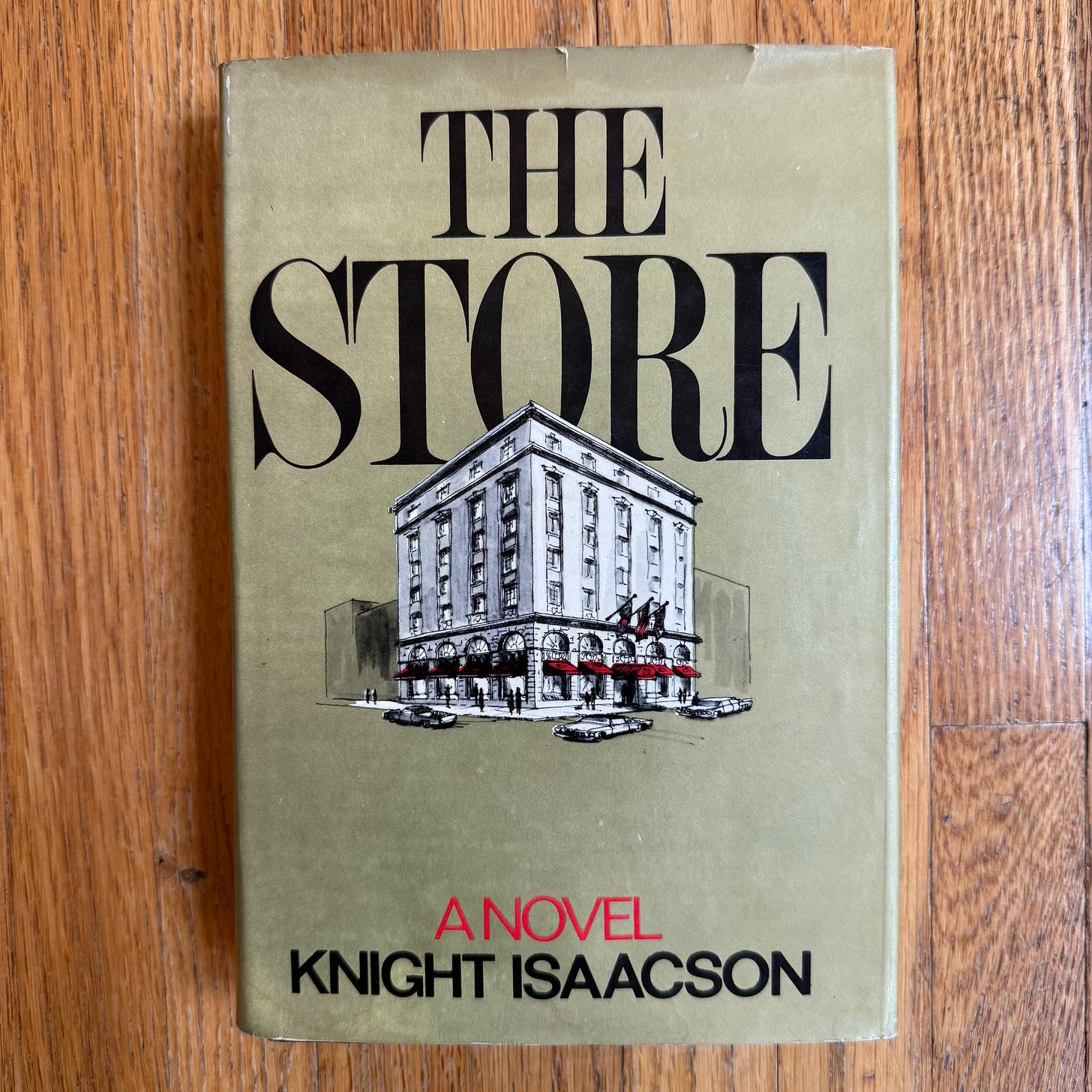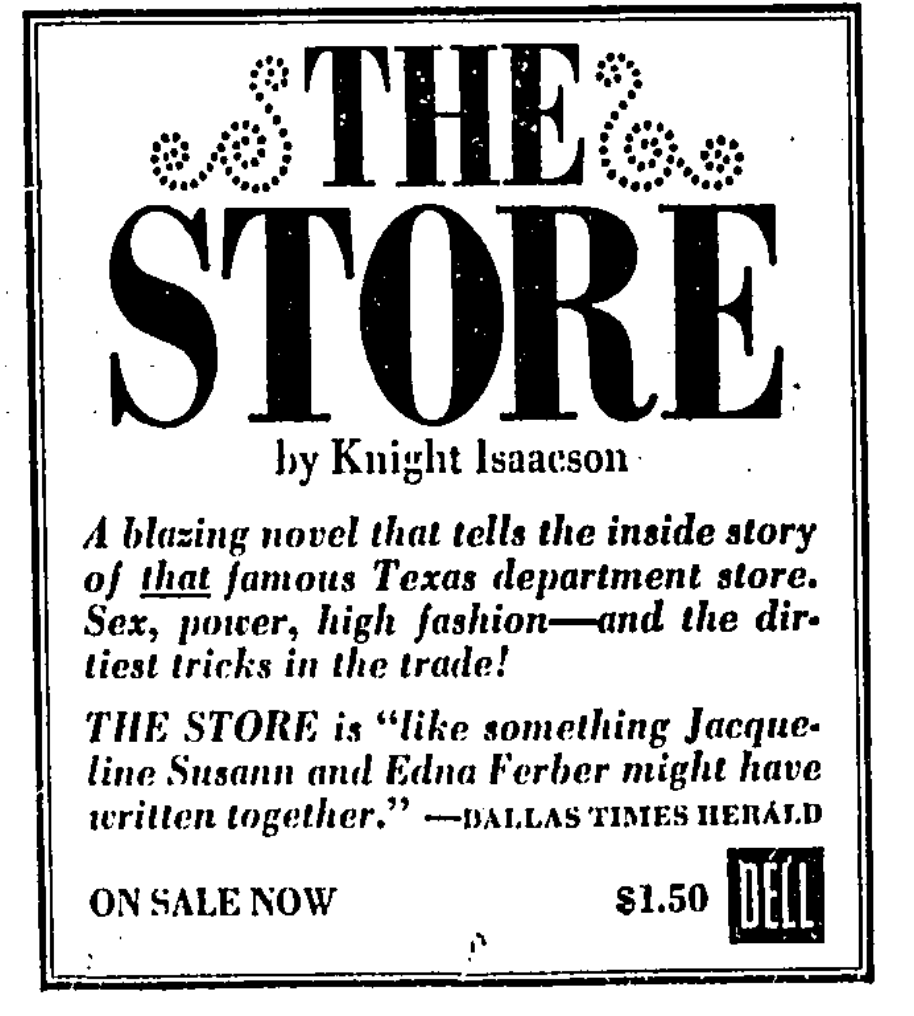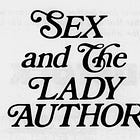Somewhere between taking care of a baby-toddler, trying to work, doomscrolling through tears of anger, other major life things, and reading for research and this newsletter, there was little time in June to put towards the things I love and that keep me going (exhibitions, old movies, books, etc.), though I did find time to indulge in one trashy fashion novel.
I’ve written before about how “beautiful people scheming and making love in beautiful homes, with a heavy dose of glamour and fashion” is my favourite literary genre; whether called bonkbusters or sex-and-shopping novels, they are pure escapism, usually heavy on the details of glamour. The Store, by Knight Isaacson and published in 1974, might just be the premier sex-and-shopping novel. A collaboration between Bud Knight, a Neiman-Marcus buyer for 17 years, and Milton Isaacson, who had been in the coat-manufacturing business, The Store is set in a very thinly-veiled Neiman-Marcus downtown Dallas flagship, now relocated to Tulsa City, Oklahoma (which they keep weirdly describing as being in the “southwest”) over the two-week-period of an import fair (or in NM parlance, a “Fortnight”). Taking place in 1964, it’s a fun read for anyone interested in fashion history who enjoys playing guessing games—who possibly could an American actress-now-princess, a handsome New York designer from the Dominican Republic, and a tough lady cosmetics manufacturer, be based on? (Those are the easy ones) At its best, it’s a seemingly correct portrayal of the procedures and tribulations it took to run a department store and put on one of these huge, multi-week events; at its worst, the sex is, admittedly, horribly written, with the gay and lesbian characters portrayed as sexual deviants.
By the time The Store came out in paperback, they didn’t even bother to hide that it was based on Neiman-Marcus:
If you, too, like this genre, here are some past recommendations:
Some good exhibitions, articles, movies and more to inspire you this month:
to read
The Reenchanted World: On finding mystery in the digital age
“It feels as if the whole world has been transformed into images of the world and has thus been drawn into the human realm, which now encompasses everything. There is no place, no thing, no person or phenomenon that I cannot obtain as image or information. One might think this adds substance to the world, since one knows more about it, not less, but the opposite is true: it empties the world; it becomes thinner. That’s because knowledge of the world and the experience of the world are two fundamentally different things. While knowledge has no particular time or place and can be transmitted, experience is tied to a specific time and place and can never be repeated. For the same reason, it also can’t be predicted. Exactly those two dimensions—the unrepeatable and the unpredictable—are what technology abolishes.
The feeling is one of loss of the world. As if the world were fading, as if there were less of it.”
The History of Advice Columns Is a History of Eavesdropping and Judging
Merve Emre’s history of advice columns is a delight to read, spanning from the seventeenth century to Reddit’s AITA.
“More than any other genre of public speech, advice brings strangers into scenes of intimate exchange. Adviser and advisee may seem to speak only to each other (often through the veil of anonymity), but their remarks will be oriented to the spectators who can read or hear their words, conferring, as Warner writes, “general social relevance to private thought and life.” These spectators evaluate the adviser and advisees on the basis of their rhetoric and their displays of emotion—in short, the styles by which they transform one person’s secret betrayal or broken promise into an impersonal theatre of moral education. Some spectators eagerly leap into the churn, asking questions, making calls, writing letters to the editor, posting comments online. This activity expands the forum of advice-giving, pulling in more voices and points of view. Advice may feel individual, but it can also be a savagely social pleasure, and it has been so for centuries.”
My Mother’s Parenting Books From The ‘80s Are A Revelation
Speaking of the history of advice, if you are currently a parent of a young child and have found contemporary parenting advice to be shaming, this article is a good starting point for looking at wider trends in parenting advice across history.
“Where joy was alluded to today, it was most often as a threat: the reminder that one day you would miss the snuggles, the warning that you only had 18 summers with your kids. In my mom’s books, sex, not work, was the dominant metaphor for the tasks of mothering, and sensuality was the antidote to the strictures of parenthood. In a chapter on postnatal nutrition, for instance, Kitzinger suggests that a bouquet of flowers on the table ‘may do more for the digestion and health of body and mind than a bottle of multi-vitamin pills or dried seaweed in the soup.’”
Keep reading with a 7-day free trial
Subscribe to Sighs & Whispers to keep reading this post and get 7 days of free access to the full post archives.









